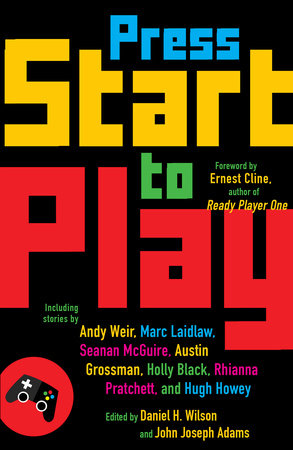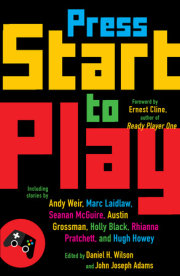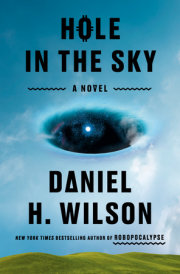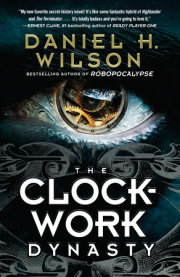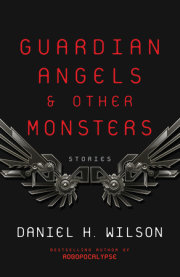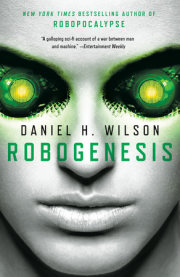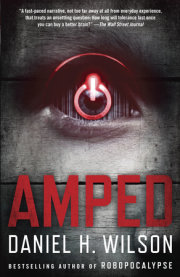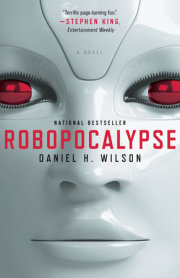God Mode
Daniel H. Wilson
Memories. Nauseous snatches of infinity trickling in, thumbing into my forehead, pinning me to this flower-smelling bed. My fractured thoughts are bursting away with the cannon-shot split of glaciers, broken towers that knife into a sea of amnesia.
In all of the forgetting, there is this one constant thing.
Her name is Sarah. I will always remember that.
She is holding my right hand with her left. Our fingers are interlaced, familiar. The two of us have held hands this way before. The memory of it is there, in our grasp.
Her hand in mine. This is all that matters to me now. Here in the aftermath of the great forgetting.
I’m twenty. Studying abroad at the University of Melbourne in Australia, learning how to make video games. Today I’m riding on a crowded tram, south to St. Kilda Beach.
Sarah.
Another American mixed in among dozens of Aussie college kids in board shorts and bikinis, all of us packed into the heaving car, bare shoulders kissing as the heat rolls off sticky black plastic floorboards. We are headed to the beach on Christmas holiday.
Her hair is brown streaked with blonde. Her lips are red. Teeth white.
The tram pulls to a stop. Double doors open accordion-style and a cool salty breeze floods in. I’m watching her when she faints. Her eyes roll up and she falls and I try to catch her. But my grip isn’t strong enough. She’s beautiful and lean and tan under a sheen of sweat. She slips through my grasp and instead of saving her, I leave four bright-red scratch marks across her shoulder blades.
Her sun-kissed hair swirls as her head hits the floor.
Sarah is only unconscious for a few seconds. Then her brown eyes are fluttering open and I’m holding her left hand with my right, pulling her up toward me, apologizing to her for the scratches and never for a moment realizing that our lives have now been grafted together, forever.
I remember. I think I can remember.
This is the day that the stars disappeared.
For the rest of the day, Sarah is woozy from the fall. Bright light hurts her eyes, so I’m pulling the plastic rolling shade down over her small dorm window. Outside, downtown Melbourne is babbling to itself. Her room is tiny, just four white-painted concrete walls cradling a college twin-size bed across from a sink. Drawers are built into the wall. We haven’t stopped talking since I pulled her to her feet.
We sit together on sheets that smell like flowers. The sun falls.
Later, we lie whispering in the dark. My bare feet are pressed against the cool wall. Muffled sounds of the dormitory reverberate around us: laughter, slamming drawers, music, the slap of feet on tile floors.
Sarah and I are talking philosophy while the stars blink out one by one, billions of miles away. The rules of physics are splintering and the foundation of rational thinking is dissolving like a half-remembered dream.
Holding hands in bed, we talk.
I can remember now. If I try very hard.
Sarah studies English. I am in Melbourne to study how to build virtual worlds. She doesn’t blame me for the scratches I left on her back when she fell. She says I was only trying to hold on. Her teeth are so white. The sharp angles of her face are tanned and an unlikely round dimple is tucked into the corner of her cheek.
A few nights later, she leaves scratches on my back.
We are both trying to hold on.
“What’s beyond the mountains?” Sarah asks me.
I am building my video game world, hands sweaty on the controller. This is my honors project. I call it Synthesis. As I create this world, my point of view leaps across valleys and over mountains. I am gazing down on a fractally generated city and its myriad, faceless inhabitants.
“Nothing,” I say.
“Nothing?” she asks. “There must be something.”
“If it isn’t rendered by the computer . . . it doesn’t exist.”
“So . . . if you can’t see it, then it isn’t there?”
“Right,” I say.
“What if you look anyway?” she asks.
On the news, they can’t stop talking about how the stars are gone.
There are quiet classes and subdued parties and always Synthesis. I lose track. We are reassured that the loss above us is some trick of the universe. Got to be. It’s impossible for stars to all disappear from the sky at the same time. They’re different distances away. The light takes different amounts of time to reach us. To disappear at once, they’d all have to have gone supernova at different moments, based on how far away from Earth they were.
Which is impossible.
Another day and I’m creating the world again. Sarah tells me I should get a hobby. Play a sport. I tell her that I’m saving my body for old age. If I don’t use up my energy now, I say, then I’ll have it ready for later. Some people burn the candle at both ends, but I blew mine out. I am saving the wax.
She laughs and laughs.
In Synthesis, I float through walls. Putting things together, you’ve got to see all the moving pieces. Sarah sits cross-legged next to me on her bed, wearing knee-length yoga pants and watching me work. She says she likes seeing how the textures roll across the landscape. A flat plane sprouts into a tangled wilderness. A gray cube shivers and grows a brick skin studded with glinting windows.
This is called “God Mode.”
It’s the act of creation, she says.
It’s just a simulation, I say.
You can simulate a nuclear blast on a supercomputer and nobody gets blown up. You can simulate the birth of a universe, but that doesn’t make you a god. The simulation is convincing, but it doesn’t have the intrinsic quality of the real thing.
The real-realness just isn’t there.
“Right?” I ask.
Sarah is quiet for a long time. I have hurt her feelings somehow.
She scoots in behind me on the bed, wrapping her long legs around my waist. Now she settles her elbows onto my shoulder blades. When she speaks I can feel her lips brushing my neck.
“If you can see it, then it’s there,” she says. “Even if it’s only gray.”
After the lights are out, Sarah and I walk up to the roof. Laying beach towels over the scabby asphalt and pebbles, we lie on our backs and peer up into a nothing sky. There are no clouds. No light coming down. Just the light of the city going up.
Like our city is at the bottom of a black ocean.
I turn my head and my cheek touches Sarah’s. I can feel that her cheek is wet.
Sarah is crying silently to see it. This emptiness.
“It’s okay,” she says. “I’m just a little scared.”
“The scientists can explain it,” I say and I don’t sound convinced.
We don’t go back up to the roof again.
I do not want to see what’s beyond the mountains.
They don’t cancel classes right away.
The man on the news interviews scientists. They have theories to explain why the stars are gone. An invisible storm of electromagnetic energy reacting with the atmosphere to block the light. An envelope of gas engulfing the planet. A primordial cloud of matter has floated in from intersolar space and swallowed our solar system.
We cling to the explanations.
—
I’m from Oklahoma. Sarah is from Manhattan. I call home once a month. She calls her mom once a week. And then one day—no more calls.
There is a story about it in the last newspaper.
All the satellites have gone. The government advises people to stay calm and in their homes. Scientists are going to figure this out, they say. The headline is that Australia has lost contact with the other continents.
Classes are canceled after that.
Things are loud in the dormitories for a little while. The walls are so thin. Friends and couples argue. Doors bang open and closed. Bags are packed and dragged down hallways. Sarah and I sit on her bed and we whisper. She keeps the panic from surging up my throat. Her hand is in mine and we squeeze until our fingers are numb. After a little while, things are much quieter.
I bring all my leftover food and a trash bag full of clothes to Sarah’s dorm and I throw it in the corner. We both agree that I should stay here from now on. My roommate was already gone when I went back to my room. He left a note saying that he had decided to head down to the coast to see if there was any news off the boats that dock there.
I don’t remember ever seeing him again.
Sarah and I lie side by side in the dark. The black of no stars has been getting more gray lately. It has been hard to keep track of the time.
“Should we run?” I ask.
“Where would we go?” she asks. “Our families are on the other side of the planet. We’re stuck between the desert and an ocean.”
The normal things. They used to be so simple. Now it is so hard to keep track.
“I don’t feel hungry,” I say.
“Me neither,” she says.
“When did we eat last?”
“I don’t know,” she whispers, and I feel her fingers searching for my hand.
Did we run? Did Sarah and I take off across the continent, searching for an explanation?
I think . . .
I can’t remember.
It always comes back to the dormitory.
The most familiar things . . . they always come back to me in the end.
Copyright © 2015 by Daniel H. Wilson. All rights reserved. No part of this excerpt may be reproduced or reprinted without permission in writing from the publisher.

